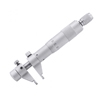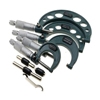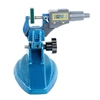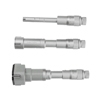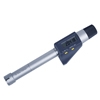A micrometer is a precision measuring instrument designed for highly accurate measurements of small dimensions, such as thickness, diameter, or depth, making it invaluable in fields like machining, manufacturing, and scientific research. Known for its exceptional precision, a standard micrometer typically measures to the nearest 0.01 millimeters, with some advanced models capable of achieving resolutions as fine as 0.001 millimeters. This high level of accuracy makes the micrometer ideal for applications requiring exact measurements, such as quality control in mechanical parts production and tool calibration. To help you make a better choice of applicable micrometers, Tool has compiled a list of prices for you:
Micrometer Price List
Micrometers are generally made from durable metal materials, allowing them to retain accuracy and reliability even under frequent or industrial use. Most micrometers are designed with user-friendly features like a thimble, spindle, and lock mechanism, enabling easy and consistent measurement readings. The tool's robust construction ensures stability and minimizes measurement deviations, while its ergonomic design often includes a ratchet stop or friction sleeve that provides consistent pressure, reducing user error and maintaining measurement accuracy across varying conditions.
Micrometer Types
There are several types of micrometers, each tailored to specific measurement tasks. The outside micrometer (or external micrometer) is the most common, used to measure the external dimensions of objects such as shafts and blocks. Inside micrometers are specialized for internal measurements, like the diameter of holes or bores, which makes them useful in checking inner dimensions in machining and engineering. Meanwhile, depth micrometers measure the depth of holes, slots, or recesses with high precision, ideal for applications where depth consistency is critical. Together, these different types of micrometers provide a comprehensive suite of tools for achieving precision across a wide range of measurement needs in professional and industrial environments.
Micrometer Application
Micrometers find application across a variety of precision-demanding fields, where accurate measurement is crucial to product quality and functionality. In manufacturing and machining, they are essential for ensuring that parts meet exact specifications, such as in the production of engine components, bearings, and other mechanical parts. Technicians and machinists use micrometers to verify that each part aligns with design tolerances, reducing the risk of defects and ensuring compatibility in assembly.
In aerospace and automotive industries, where even minute deviations in size can impact performance or safety, micrometers are critical tools for quality control. Engineers rely on micrometers to measure the thickness and diameter of components like fuel injectors, turbine blades, and structural parts, helping to maintain the high standards required in these industries.
Micrometers also play a vital role in scientific research and material testing laboratories, where precise measurements of samples are often necessary. Researchers measure materials’ physical properties, such as thickness or consistency, to study characteristics like strength, flexibility, or conductivity. This tool is also commonly used in metrology, where it helps in calibrating other measurement instruments by providing a reliable standard of small dimensions.
In tool and die making, micrometers help create custom tools and molds with exact specifications, essential for producing high-precision parts. Their use extends to jewelry and watchmaking as well, where delicate parts require careful measurement and fitting. Across these diverse fields, micrometers enhance accuracy, ensure consistency, and uphold the quality of finished products, making them indispensable tools in precision engineering and fabrication.

